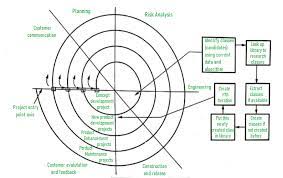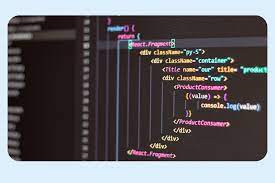Java Full Stack Developer: The Ultimate Guide
A Java Full Stack Developer is a professional who has expertise in both front-end and back-end development using the Java programming language. They are responsible for designing, developing, and maintaining web applications that are user-friendly, responsive, and secure.
To become a Java Full Stack Developer, one needs to have a strong understanding of the core concepts of Java programming language, as well as knowledge of front-end technologies such as HTML, CSS, and JavaScript. They should also be familiar with back-end technologies such as Spring Boot, Hibernate, and SQL databases.
Here are some key skills that every Java Full Stack Developer should possess:
- Proficiency in Java Programming Language: A strong foundation in the Java programming language is essential for becoming a successful Full Stack Developer. This includes knowledge of object-oriented programming (OOP) concepts such as inheritance, polymorphism, and encapsulation.
- Front-End Development Skills: A good understanding of front-end development technologies such as HTML5, CSS3, JavaScript/jQuery is necessary to create responsive and user-friendly web applications.
- Back-End Development Skills: Knowledge of back-end technologies such as Spring Boot (or any other MVC framework), Hibernate/JPA for database connectivity is essential for creating robust web applications.
- Knowledge of Databases: Understanding database concepts like normalization/de-normalization and SQL queries is crucial to store data efficiently.
- Familiarity with DevOps Tools: Experience with DevOps tools like Git for version control systems is important for managing codebase efficiently.
- Problem-Solving Skills: As a developer, one needs to solve complex problems by breaking them down into smaller parts and finding solutions for each part.
- Good Communication Skills: As a team player in an agile environment or while working remotely with clients across different time zones good communication skills are essential.
Java Full Stack Developers work on various projects ranging from small-scale web applications to large enterprise applications. They are responsible for designing, developing, testing, and deploying web applications while ensuring that the code is scalable, maintainable and secure.
In conclusion, Java Full Stack Development is a rewarding career path for those who have a passion for programming and are willing to learn continuously. With the right skills and knowledge, one can become a successful Full Stack Developer in no time.
5 Advantages of Hiring a Java Full Stack Developer: Comprehensive Knowledge, Increased Efficiency, Faster Troubleshooting, Adaptability, and Versatility
Challenges Faced by Java Full Stack Developers: Limited Opportunities, High Expertise, Complexity, and Expensive Training
Comprehensive Knowledge
Comprehensive Knowledge: The Pro of Java Full Stack Developer
One of the biggest advantages of being a Java Full Stack Developer is the comprehensive knowledge they possess. A Java Full Stack Developer has an in-depth understanding of both front-end and back-end development, and can work with all the technologies involved in developing a complete application.
This means that a Java Full Stack Developer can handle everything from designing the user interface to writing server-side code and integrating it with databases. They have expertise in all aspects of web development, which makes them highly valuable to any organization.
Having comprehensive knowledge also means that Java Full Stack Developers can work more efficiently. They don’t need to rely on other developers for different components of the application, which reduces communication overhead and speeds up the development process. This makes them an asset to any team, as they can take ownership of entire projects and deliver high-quality results.
Moreover, having comprehensive knowledge allows Java Full Stack Developers to troubleshoot issues more effectively. They can quickly identify problems across different layers of the application and come up with solutions that address root causes rather than just symptoms.
In conclusion, having comprehensive knowledge is a significant pro for Java Full Stack Developers. It enables them to work efficiently, take ownership of projects, and troubleshoot issues effectively. With this skill set, they are well-equipped to develop robust web applications that meet business requirements while delivering an excellent user experience.
Increased Efficiency
Java Full Stack Developer: Increased Efficiency
One of the major benefits of hiring a Java Full Stack Developer is increased efficiency. By having a single resource for both front-end and back-end development, organizations can reduce the time taken to develop applications as well as save costs associated with hiring multiple developers.
Traditionally, front-end and back-end development were handled by separate teams, which often led to communication gaps and delays in the development process. With a Java Full Stack Developer, however, organizations can streamline their development process by having a single developer who can handle both aspects of application development.
This increased efficiency not only saves time but also reduces costs associated with hiring multiple developers. Since a Java Full Stack Developer has expertise in both front-end and back-end technologies, they can handle all aspects of application development from design to deployment. This means that organizations do not need to hire separate developers for each stage of the development process, resulting in significant cost savings.
Moreover, having a single resource for both front-end and back-end development ensures that there is better coordination between different stages of application development. This leads to fewer errors and faster turnaround times for bug fixes.
In conclusion, hiring a Java Full Stack Developer can significantly increase efficiency in the application development process. With their expertise in both front-end and back-end technologies, they can handle all aspects of application development from design to deployment. This not only saves time but also reduces costs associated with hiring multiple developers while ensuring better coordination between different stages of application development.
Faster Troubleshooting
Faster Troubleshooting: The Benefit of Being a Java Full Stack Developer
One of the key benefits of being a Java Full Stack Developer is the ability to troubleshoot issues quickly. This is because they have a comprehensive understanding of both front-end and back-end development, which enables them to identify and resolve issues faster than developers who specialize in only one area.
Java Full Stack Developers are equipped with the knowledge and skills needed to understand how different components of an application work together. This helps them to quickly identify the root cause of any issues that may arise in the application. For example, if there is a problem with the user interface, they can easily trace it back to the code running on the server and vice versa.
The ability to troubleshoot issues quickly is essential for developers working on time-sensitive projects. It can save valuable time and resources that would otherwise be spent on identifying and resolving issues. Additionally, it can help prevent delays in project timelines or delivery dates.
Another advantage of being a Java Full Stack Developer is that it eliminates the need for multiple resources to solve complex problems. Instead of relying on separate front-end and back-end developers, businesses can hire a single Java Full Stack Developer who has expertise in both areas. This not only saves costs but also ensures that communication between team members is streamlined, resulting in faster issue resolution.
In conclusion, being a Java Full Stack Developer offers many benefits including faster troubleshooting capabilities. Their comprehensive understanding of both front-end and back-end development enables them to quickly identify and resolve issues, saving valuable time and resources for businesses.
Adaptability
Adaptability: The Key Pro of Java Full Stack Developers
In today’s fast-paced world, technology is constantly evolving, and businesses need to keep up with the latest trends to stay competitive. This is where Java Full Stack Developers come in. Their adaptability is one of the key pros that makes them ideal for working on projects that require frequent changes or updates due to changing business needs or customer requirements.
Java Full Stack Developers are proficient in both front-end and back-end development, which means they have a broad skillset that can be applied to various projects. They are able to quickly adapt to new technologies and frameworks, making them valuable assets for any organization.
Adaptability is essential for Full Stack Developers as they work on diverse projects that require different technologies and approaches. They need to be able to switch between front-end and back-end development seamlessly while ensuring that the application works smoothly from end-to-end.
Another advantage of their adaptability is their ability to work in agile environments. Agile methodologies require developers to be flexible and adaptable, responding quickly to changes in project requirements or customer needs. Java Full Stack Developers are well-suited for this type of work as they can easily switch gears when needed.
In conclusion, adaptability is one of the key pros of Java Full Stack Developers. Their ability to quickly adapt to new technologies and work in agile environments makes them valuable assets for any organization. With their broad skillset and ability to work on diverse projects, they are well-positioned for success in today’s fast-paced tech industry.
Versatility
Versatility: The Advantages of Being a Java Full Stack Developer
Java Full Stack Developers are highly versatile individuals with the ability to work on a variety of projects. One of the key advantages of being a Java Full Stack Developer is their knowledge of various programming languages and frameworks. This makes them versatile and able to move from one technology stack to another without any difficulty.
The ability to work with multiple programming languages and frameworks is essential in today’s dynamic technological landscape. With new technologies emerging every day, developers need to be adaptable and quick learners. Java Full Stack Developers have an advantage in this regard as they possess diverse skills that enable them to switch between different technologies with ease.
Moreover, versatility is an essential trait for developers who want to work on different projects. As a Java Full Stack Developer, you can work on various projects ranging from small-scale web applications to large enterprise applications. This versatility allows you to explore different areas of development and find the niche that suits your interests.
In addition, being versatile also means that you can collaborate with teams working on different technologies. For instance, if you are working on a project that requires front-end development skills, you can easily collaborate with other developers who specialize in front-end technologies like Angular or React.
In conclusion, being a Java Full Stack Developer comes with many advantages, including versatility. The ability to work with multiple programming languages and frameworks makes them valuable assets in today’s fast-paced technological environment. If you are looking for a career in software development or want to expand your skill set, becoming a Java Full Stack Developer may be the right path for you.
Limited Opportunities
Limited Opportunities for Java Full Stack Developers: A Con to Consider
Java Full Stack Developers are highly skilled professionals who possess a wide range of technical expertise. They are in high demand in the job market due to their ability to design, develop and maintain web applications that are user-friendly, responsive and secure. However, despite the high demand for Java Full Stack Developers, there is still a limited number of opportunities available for them.
One reason for this is that many companies prefer to hire specialized developers who focus solely on either front-end or back-end development. This means that Java Full Stack Developers may find it challenging to find job opportunities that require their full range of skills.
Another reason for limited opportunities is the competition from other programming languages such as Python, Ruby on Rails, and JavaScript. These languages have gained popularity due to their ease of use and flexibility, which has led some companies to choose them over Java.
Moreover, some companies may prefer hiring junior developers or outsourcing their development needs to offshore teams instead of hiring experienced Java Full Stack Developers. This can be a disadvantage for experienced developers looking for challenging projects and competitive salaries.
In conclusion, while there is no doubt about the high demand for Java Full Stack Developers in today’s job market, it’s important to consider the limited opportunities available when choosing this career path. However, with continuous learning and updating one’s skills as per industry trends can help overcome this challenge and increase the chances of finding new opportunities.
High Level of Expertise
High Level of Expertise: A Challenge for Aspiring Java Full Stack Developers
Becoming a successful Java Full Stack Developer requires a high level of expertise in both front-end and back-end development. This can be a daunting challenge for those who are just starting out in the field or have limited experience in programming.
To become proficient in Java Full Stack Development, one needs to invest time and effort in learning the core concepts of programming, as well as front-end and back-end technologies. This can include studying object-oriented programming (OOP) concepts, HTML, CSS, JavaScript/jQuery, Spring Boot, Hibernate/JPA, and SQL databases.
Moreover, staying up-to-date with the latest trends and advancements in technology is crucial to remain competitive in the industry. This means continuously learning new tools and techniques to enhance one’s skills.
The high level of expertise required to become a successful Java Full Stack Developer can be a significant challenge for some individuals. It requires dedication, hard work, and perseverance to acquire the necessary skills and knowledge.
However, it is important to note that with proper training and guidance from experienced professionals or mentors, even aspiring developers with limited experience can become proficient in Java Full Stack Development. One can also opt for online courses or certifications to gain knowledge on this subject.
In conclusion, while the high level of expertise required for becoming a successful Java Full Stack Developer can be challenging, it should not deter individuals from pursuing this career path. With dedication and continuous learning efforts, anyone can acquire the necessary skills and knowledge to excel in this field.
Increasing Complexity
Increasing Complexity: A Challenge for Java Full Stack Developers
Java Full Stack Development is a dynamic field that requires constant learning and adaptation to keep up with the fast-paced changes in technology. As technology advances, the complexity of developing applications with Java increases, and this can make it difficult for some developers to keep up with the changes.
One of the biggest challenges faced by Java Full Stack Developers is the increasing complexity of the technology stack. With new frameworks, libraries, and tools being introduced every day, developers need to stay abreast of these developments to remain competitive in the industry.
The increasing complexity can also make it challenging for developers to troubleshoot issues that arise during development. As the technology stack becomes more complex, so do the problems that arise. This can lead to longer development cycles and increased costs.
Another challenge that developers face is ensuring that their applications are secure. With cyber threats becoming more sophisticated, developers need to be constantly vigilant about security vulnerabilities in their code. This requires a deep understanding of security best practices and a commitment to staying up-to-date with emerging threats.
Despite these challenges, Java Full Stack Development remains an exciting and rewarding career path for those who are passionate about programming. By staying up-to-date with emerging technologies and continuously improving their skills, developers can overcome these obstacles and create innovative solutions that meet the needs of businesses today.
In conclusion, while increasing complexity may pose a challenge for some Java Full Stack Developers, it should not deter them from pursuing this career path. The key is to stay motivated, continuously learn new skills and technologies while keeping an eye on emerging trends in order to stay ahead of the curve in this dynamic field.
Expensive Training Costs
Expensive Training Costs: A Con of Java Full Stack Developer
Becoming a qualified Java Full Stack Developer is a highly sought-after profession in today’s market. However, one of the significant drawbacks to this career path is the expensive training costs that come with it. To become a qualified Java Full Stack Developer, individuals need to have expertise in both front-end and back-end development using the Java programming language, which requires additional training and education.
The cost of training courses for Java Full Stack Development can be quite high, which not everyone can afford or have access to. This can be especially challenging for those who are just starting their careers or are looking to switch careers. The high cost of training courses can create a barrier for many individuals who are interested in pursuing this career path.
Moreover, the cost of training courses is not limited to just tuition fees. Additional expenses such as textbooks, software licenses, and hardware upgrades can also add up quickly. This can be daunting for those who are already struggling financially or have other financial obligations.
However, there are ways to overcome this challenge. There are many online resources available that offer free or low-cost training courses for Java Full Stack Development. Additionally, some employers offer on-the-job training programs that provide employees with the necessary skills and knowledge required to become a qualified Java Full Stack Developer.
In conclusion, while expensive training costs may be a con of becoming a qualified Java Full Stack Developer, it should not discourage individuals from pursuing this career path. With dedication and hard work, anyone can overcome this challenge and become a successful Java Full Stack Developer without breaking the bank.



